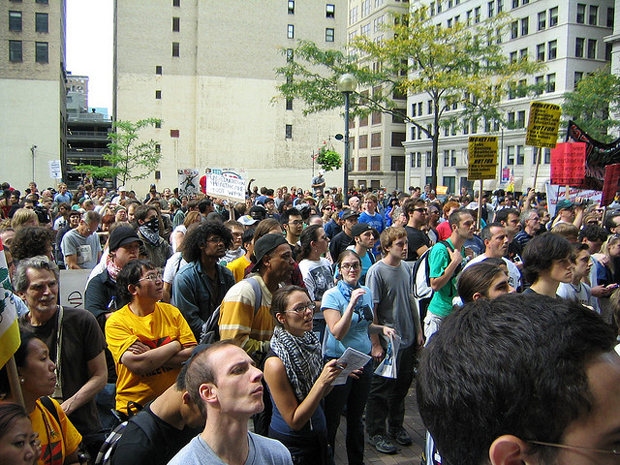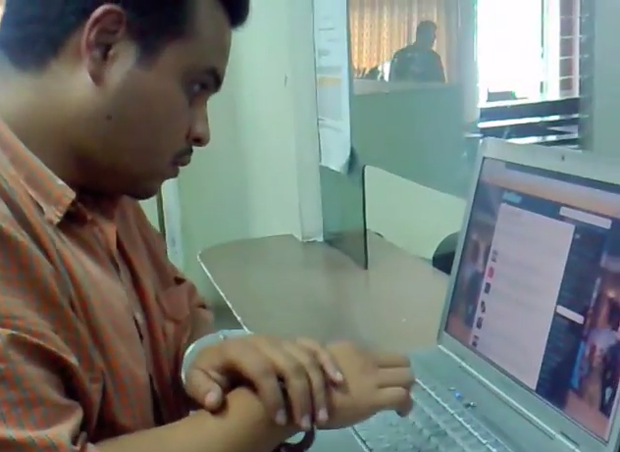23 Jan 2015 | News and features
Bahrain
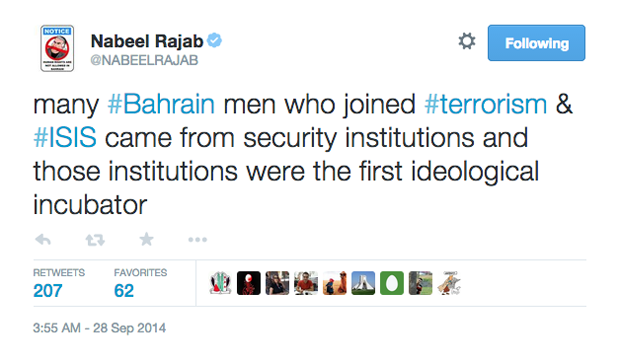
This week, prominent Bahraini human rights activist Nabeel Rajab was handed down a six month suspended sentence over a tweet in which both the country’s ministry of interior and ministry of defence allege that he “denigrated government institutions”. Rajab was only released last May after two years in prison, over charges that included sending offensive tweets. His experience is not unique in Bahrain. In May 2013, five men were arrested for “insulting the king” via Twitter.
Turkey
A former Miss Turkey was recently arrested for sharing a satirical poem criticising the country’s President Recep Tayyip Erdogan on her Instagram account. She is set to go on trial later this year. Turkey has a chequered relationship with social media, temporarily banning both Twitter and YouTube in the wake of the Gezi Park protests, in large part organised and reported through social media. In 2013, authorities arrested 25 individuals for spreading “untrue information” on social media.
Saudi Arabia
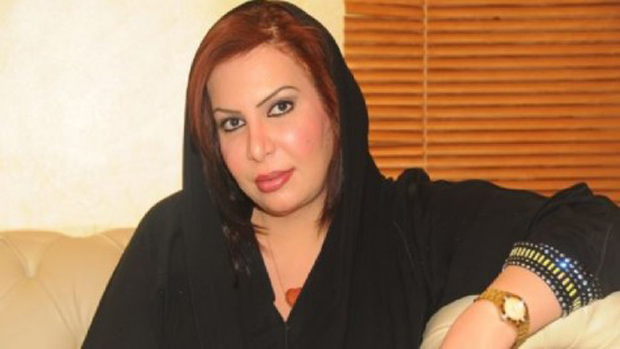
(Photo: Gulf Centre for Human Rights)
In late 2014, women’s rights activist Souad Al-Shammari was arrested during an interrogation over some of her tweets. The charges against her include “calling upon society to disobey by describing society as masculine” and “using sarcasm while mentioning religious texts and religious scholars”, according to the Gulf Centre for Human Rights.
France
![(Photo: « Source : Réseau Voltaire » [CC BY-SA 3.0 (http://creativecommons.org/licenses/by-sa/3.0)], via Wikimedia Commons](https://www.indexoncensorship.org/wp-content/uploads/2015/01/Dieudonné_Axis_for_Peace_2005-11-18.jpg)
(Photo: Réseau Voltaire [CC BY-SA 3.0], via Wikimedia Commons)
Following the series of terrorist attacks in Paris in early January, at least 54 people have been detained by police for “defending or glorifying terrorism”. A number of the cases, including against comedian Dieudonne M’bala M’bala, are believe to be connected to social media comments.
Britain

A 22 year old man was arrested in for “malicious communication” following Facebook messages made in response to the murder of soldier Lee Rigby, and another user was arrested after taunting Olympic diver Tom Daly about his dead father. More recently, police arrested a 19-year-old man over an “offensive” tweet about a bin lorry crash in Glasgow that killed six people. TV personality Katie Hopkins, known for her controversial tweets, was also reported to Scottish police following some tasteless tweets about about Scots. The incident prompted Scottish police the to post their now infamous tweet declaring they would continue to “monitor comments on social media“.
China
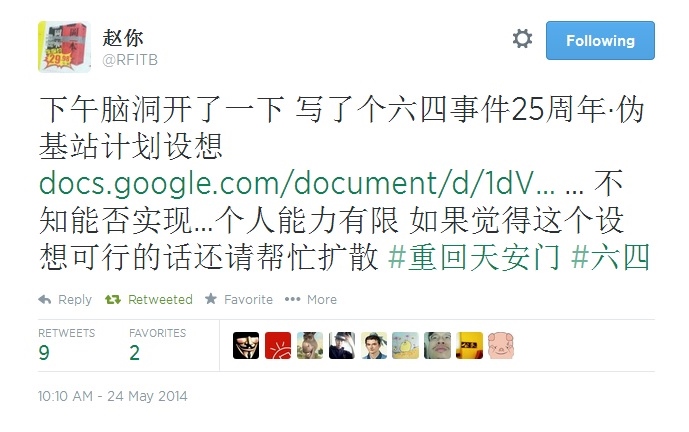
Online activist Cheng Jianping was arrested on her wedding day in 2010 for “disturbing social order” by retweeting a joke by her fiance. She was sentenced to one year of “re-education through labour”. Twitter is officially banned in China, and microblogging site Weibo is a popular alternative. In 2013, four Weibo users were arrested for spreading rumours about a deceased soldier labelled a hero and used in propaganda posters. The four were said to have “incited dissatisfaction with the government”, according to the BBC.
Australia
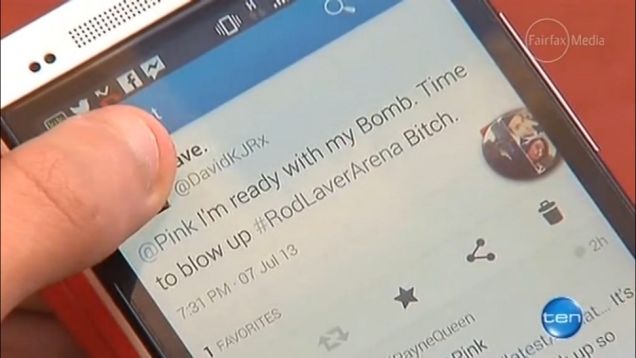
A teen was arrested prior to attending a Pink concert in Melbourne for tweeting: “I’m ready with my Bomb. Time to blow up #RodLaverArena. Bitch.” The tweet referenced lyrics from the American popstar’s song Timebomb.
India
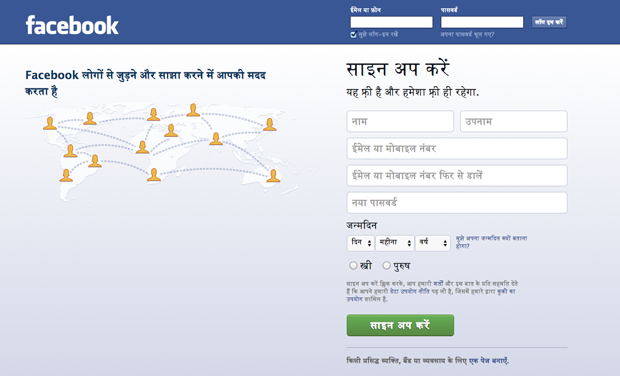
An Indian medical student was arrested in 2012 over a Facebook post questioning why her city of Mumbai should come to a standstill to mark the death of a prominent politician. Her friend was arrested for liking the post. Both were charged with engaging in speech that was offensive and hateful.
United States
Back in 2009, a New York man was arrested, had his home searched and was placed under £19,000 bail for tweeting police movements to help G20 protesters in Pittsburgh avoid the officers. According to Global Voices, it is unclear whether his actions were actually illegal at the time.
Guatemala
A man was arrested in 2009 for causing “financial panic” by tweeting that Guatemalans should fight corruption by withdrawing all their money from banks.
This article was posted on 23 January, 2015 at indexoncensorship.org
14 Jan 2015 | Campaigns, Statements
The arrest of French comedian Dieudonné today appears to be connected to a Facebook comment he posted after Sunday’s march in Paris in which he said he felt he “finally returned home… I feel like Charlie Coulibaly” – remarks that have been interpreted as condoning the action of one of the terrorists involved in the killings of 17 people in Paris last week.
It is important to be clear that while incitement to terrorism is a crime, commentary or jokes about terrorism – no matter how offensive or tasteless – are not. Opinions are protected by the right to freedom of expression.
“You cannot address bigoted and offensive ideas by banning them. To do so simply drives them underground,” said Index CEO Jodie Ginsberg. “The attacks on Charlie Hebdo should be a spur to every one of us to defend ever more vigorously free speech in all forms – even and especially when it represents opinions we find abhorrent or disagree with – so that all views are represented and can be challenged.”
The full text of the Dieudonne remark, later deleted, is as follows: “After this historic march what do I say…Legendary. Instant magic equal to the Big Bang that created the universe. To a lesser extent (more local) comparable to the coronation of Vercingétorix, I finally returned home. You know that tonight as far as I’m concerned I feel like Charlie Coulibaly”.
As Article 19 points out in a statement today, publicly condoning (faire publiquement l’apologie) acts of terrorism is a crime under Article 421-2-5 of the French Criminal Code.
The offence is punishable with up to five years’ imprisonment, and a fine of €75,000. Harsher penalties for the offence are available when it is committed online, allowing up to seven years’ imprisonment and a fine of €100,000.
“International standards are clear that terrorism offences should not be so broad or vague as to encompass expression where there is no actual intent to encourage or incite terrorist acts,” Article 19 said. “To impose criminal sanctions, there must be a direct and immediate connection between the expression at issue, and the likelihood or occurrence of such violence.”
14 Jan 2015 | Europe and Central Asia, France, News and features, Turkey
In October, Turkish cartoonist Musa Kart was the subject of a global solidarity campaign from his fellow artists. Kart was facing nine years in jail for insulting President Recep Tayyip Erodgan through a caricature for Cumhuriyet, where he commented on Erdogan’s alleged hand in covering up a high-profile corruption scandal. In response, his colleagues from around the world rallied in support of Kart, publishing their own #ErdoganCaricature on Twitter, and he was acquitted of the charges. This time, Kart is joining cartoonists in standing with Charlie Hebdo.
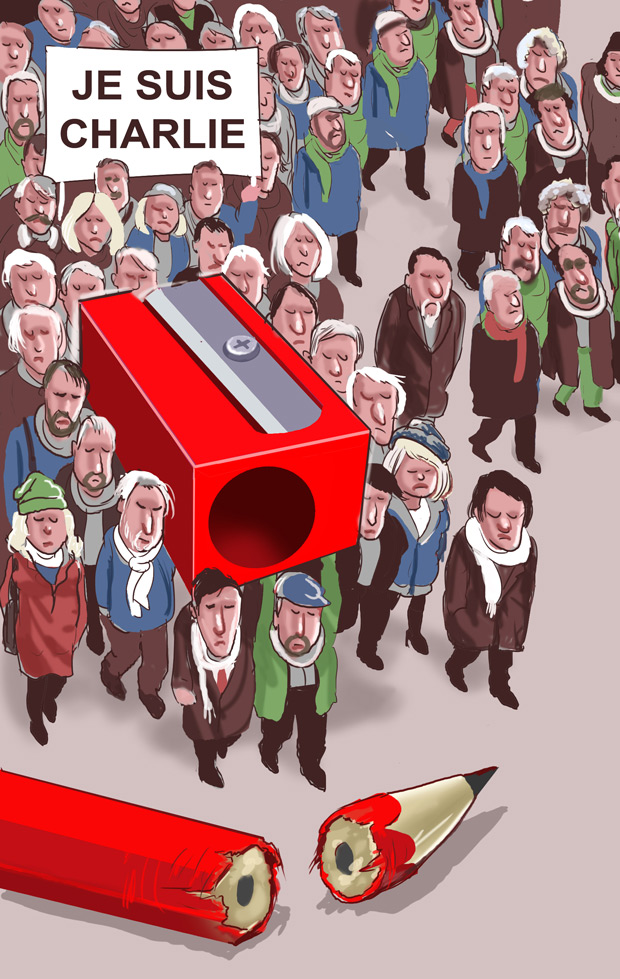
Cartoon courtesy Musa Kart
Kart told Index he feels “so sorry” and he has “lost his brothers” in last Wednesday’s brutal attack on the French satirical magazine’s offices, where 12 people — including cartoonists Stéphane Charbonnier aka Charb, Jean Cabut aka Cabu, Georges Wolinski and Bernard Verlhac aka Tignous — were killed.
Kart also ran into trouble with Turkish authorities back in 2005, when he was fined 5,000 Turkish lira for drawing then-Prime Minister Erdogan as a cat entangled in yarn. Kart puts the spotlight on Erdogan’s chequered history with cartoonists rights in a second piece, where the president declares that: “I condemn the attack. Ten years prison would have been enough for the cartoonists.”
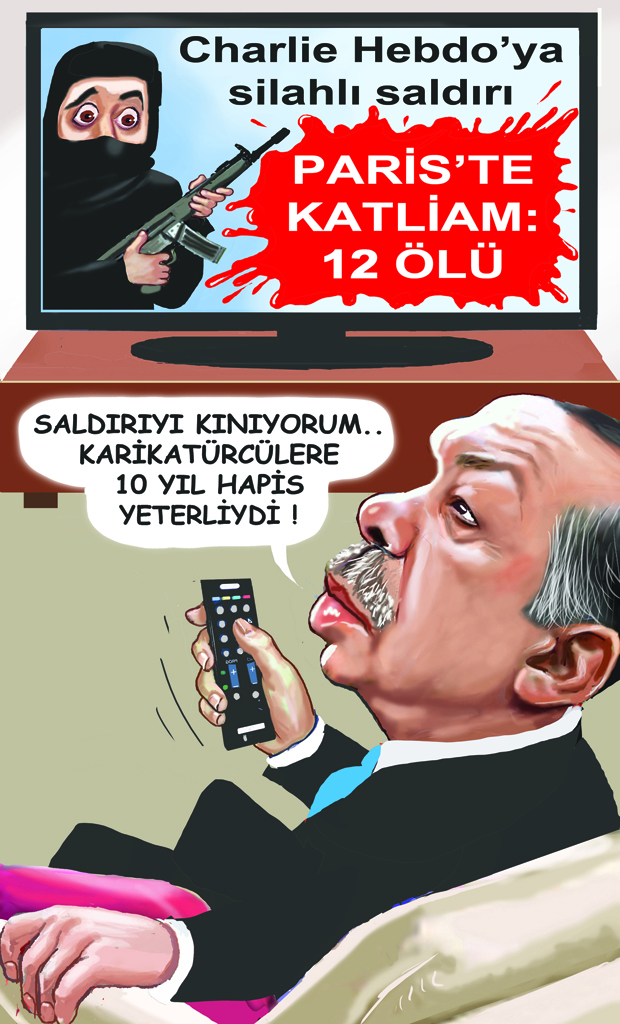
TV: “Massacre in Paris. Twelve dead.” President Erdogan: “I condemn the attack. 10 years prison would have been enough for the cartoonists.”
Erdogan condemned the “heinous terrorist attack” and Turkey’s Prime Minister Ahmet Davutoglu joined last Sunday’s march for unity in Paris. Much has been made of the apparent hypocrisy of world leaders who have suppressed free speech at home, taking part in what many considered a defiant show of support for that very right.
As Index CEO Jodie Ginsberg pointed out, Turkey imprisons more journalists than any other country in the world. Index’s media freedom map has received 72 reports of press freedom violations from Turkey since May 2014 alone. In the wake of the attacks in Paris, other Turkish cartoonists have been threatened by pro-government social media users. Police also raided the printing press of Cumhuriyet, as it prepared to publish selections from today’s issue of Charlie Hebdo.
Ecuadorian cartoonist Xavier Bonilla — known as Bonil — has also been targeted for his work. In 2013, the country got a new communications law which allows the government to fine and prosecute the media. After drawing a cartoon for El Universo, based on a raid on the home of a journalist and opposition advisor, Bonil became a victim of the new legislation. President Rafael Correa — who has been known to personally file lawsuits against critical journalists — ordered that a case be opened against the cartoonist. It found that his piece had invited social unrest and should be “rectified”, while El Universo was fined $92,000.
“I believe that humour is the best antidote to fear and the best defence against abuses of power. I have been drawing for 30 years, and I am not going to back down,” he wrote in an article in the current issue of Index on Censorship magazine.
Below are his cartoons in support of Charlie Hebdo.
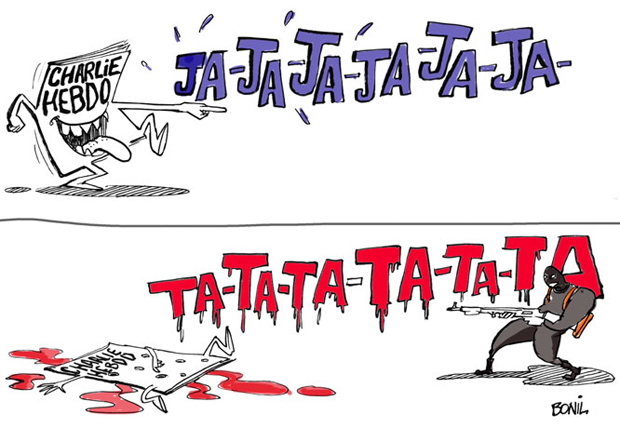
Cartoon courtesy of Bonil
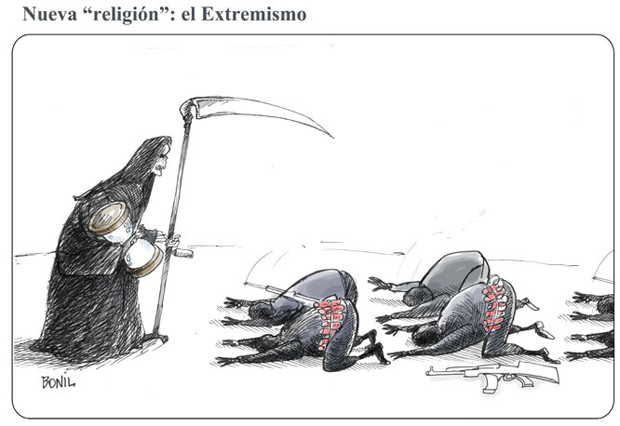
“New ‘religion’: extremism”
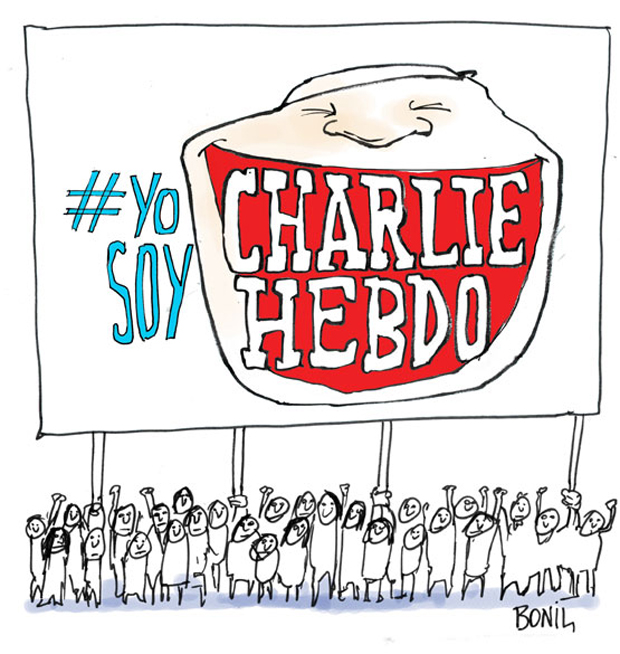
#IAmCharlieHebdo
This article was posted on 14 January 2015 at indexoncensorship.org
7 Jan 2015 | Europe and Central Asia, France, News and features
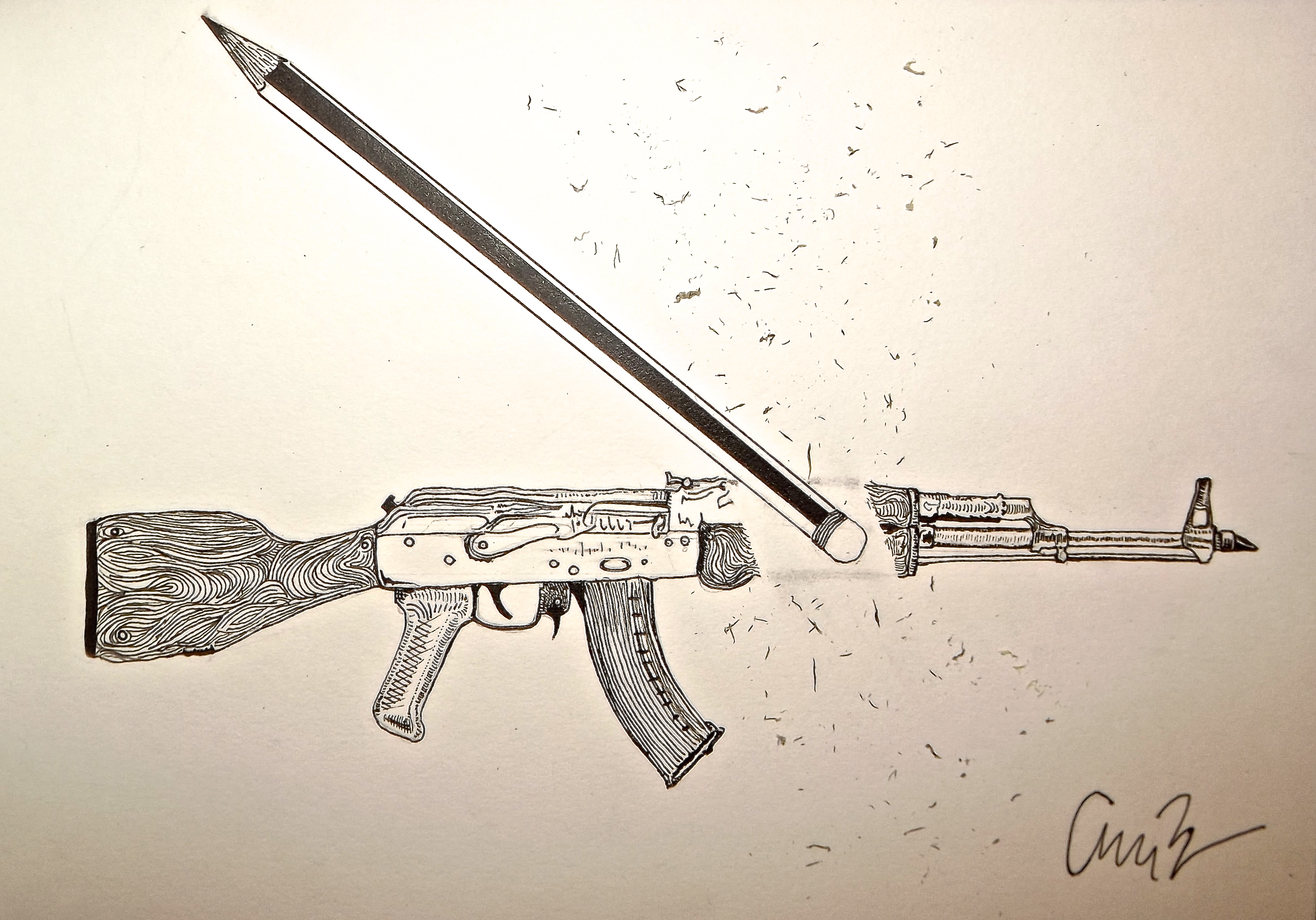
Cartoonist Charley-Kai John reflects on the attack.
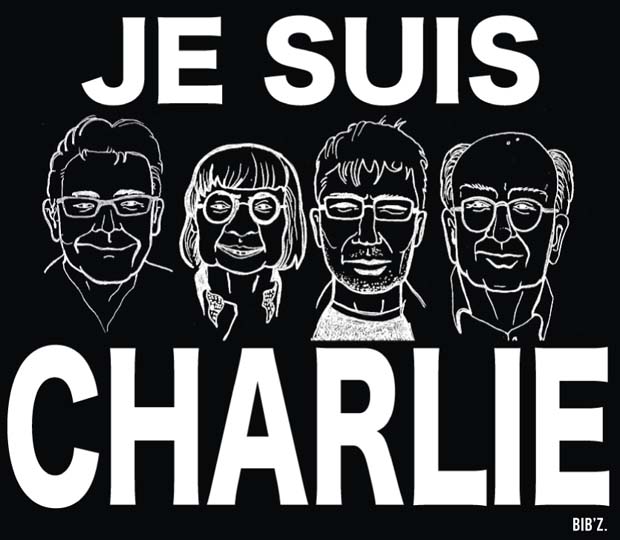
They Are Charlie: a tribute to cartoonists Bernard Verlhac aka Tignous, Jean Cabut aka Cabu, Stéphane Charbonnier aka Charb and Georges Wolinski by French artist Bib’z.
Armed men attacked the offices of French satirical magazine Charlie Hebdo on Wednesday. They killed two police officers and ten members of the magazine’s staff, including cartoonists Stéphane Charbonnier aka Charb, Jean Cabut aka Cabu, Georges Wolinski and Bernard Verlhac aka Tignous. The magazine has been targeted in the past over its controversial cartoons, including ones featuring the Prophet Mohammed. In 2011, the office was firebombed.
Index has condemned the appalling attack, saying there is nothing that could justify it. “The ability to express ourselves freely is fundamental to a free society. This includes the freedom to publish, to satirise, to joke, to criticise, even when that might cause offence to others. Those who wish to silence free speech must never be allowed to prevail,” added Index CEO Jodie Ginsberg.
Throughout the day, people from across the world have showed solidarity using the hashtag #JeSuisCharlie, while many cartoonists have supported the magazine through their art.
“Cartoonists are among the first people targeted by extremists and fundamentalists for poking fun at the sacred cows of our societies. Humour and satire are tools that close minded extremists have little defence against except by the use of weapons and murder,” Dr. Robert Russell, executive director of Cartoonists Rights Network International said in a statement.
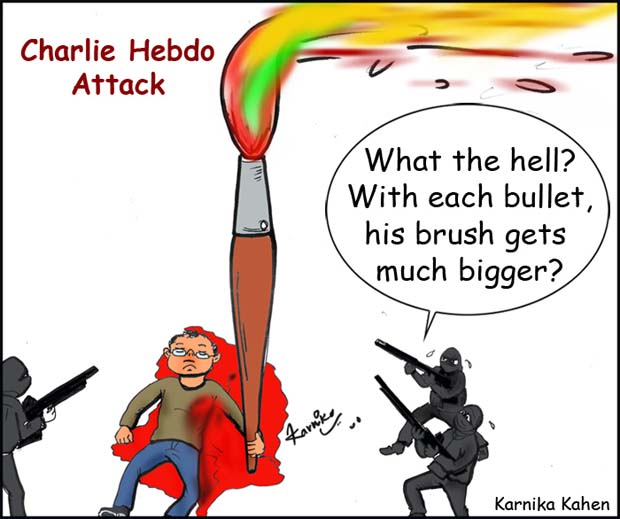
Indian cartoonist Kanika Mishra showing solidarity with Charlie Hebdo
“I feel very sad, horrified and hopeless after hearing this news,” Indian cartoonist Kanika Mishra, who drew the piece above, told Index. “One year ago, I was facing such threats when I made cartoons on [charismatic guru] godman Asaram but I never took those threats seriously. I never knew some blind followers and extremists can go to such extent. Whole world should be united against such horrific attacks on freedom of speech and its high time that we should start talking about a global policy for protecting the rights of every artist in the world.”
Martin Rowson, cartoonist for The Guardian, The Independent and Index among others, added that “we need above all else to laugh these blood-stained clowns back into the dustbin of history, and urgently.”
Below is a selection of the cartoons being shared on social media.
This article was published on 7 January and updated on 8 January 2015 at indexoncensorship.org
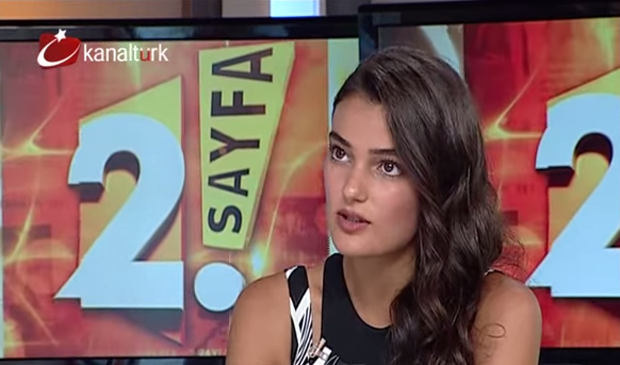
![(Photo: « Source : Réseau Voltaire » [CC BY-SA 3.0 (http://creativecommons.org/licenses/by-sa/3.0)], via Wikimedia Commons](https://www.indexoncensorship.org/wp-content/uploads/2015/01/Dieudonné_Axis_for_Peace_2005-11-18.jpg)



